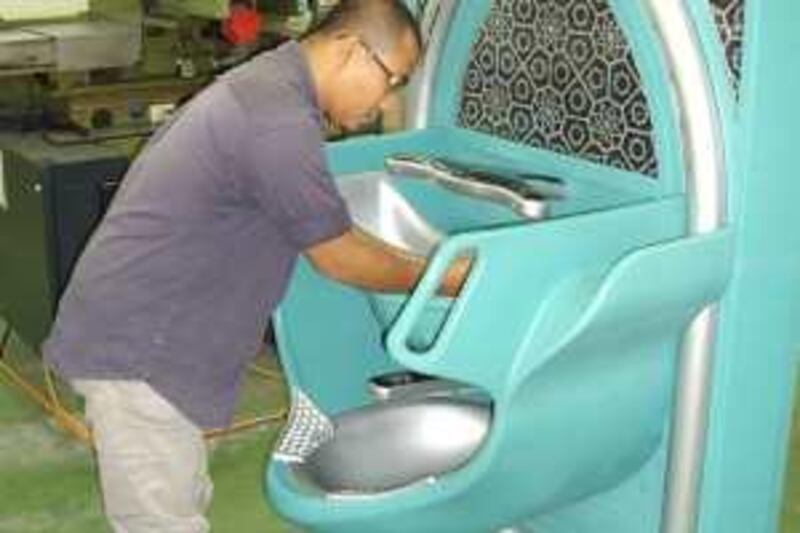CAIRO // A device that debuts next month may solve one of the Islamic world's oldest and most intractable conflicts: the battle between feet and fungus. "If you go to any Muslim in a really large mosque, he will tell you that this is a problem," said Anthony Gomez, the inventor of the Auto Wudu Washer (AWW), a device that will allow Muslims to perform their ritual ablutions before prayer - called wudu - without coming into contact with any dirty surfaces.
The AWW is fully automated, self-drying and coated with a nano-silver surface that is both anti-bacterial and anti-fungal. Indeed, the new device will address a very real medical problem. Foot fungus, which is commonly referred to as athlete's foot, afflicts most devotees who regularly attended prayers at a mosque. Much of this is the result of damp rugs - a problem that stems from inadequately dried feet treading on carpets.
Mr Gomez, who is not a Muslim, was inspired to design the washer during a business trip to the Middle East in 2006. While travelling by boat from Aqaba, Jordan, to Taba, Egypt, Mr Gomez entered the bathroom to find dozens of men washing themselves. "They were lifting up their feet and putting them in the washbasin and then putting their feet on the floor again," Mr Gomez said. "I thought to myself 'there must be a better way'." And, at US$2,000 (Dh7,340) per unit, there is. The first shipment of 500 washers will arrive in Kuwait next month. The Qatari government has ordered 2,000 units. Mr Gomez said his company, AACE Technology, is in consultations with the Abu Dhabi government for 14,000 units as part of an upcoming renovation scheme of 3,000 mosques across the emirate.
But Mr Gomez is quick to clarify that his washers are not just playthings. They represent prudent investments for national governments, religious institutions and individual benefactors - especially in countries where water is scarce and expensive. In the UAE, for example, where Mr Gomez estimates between $17 million and $26m is spent each year on the water used in wudu, outfitting mosques and offices with the AWW could represent a savings of 74 per cent to 90 per cent. That is because one auto wudu uses only about 1.3 litres of water per person instead of the average six litres to seven litres used by today's faithful during each wash.
In Saudi Arabia, where an enduring water shortage worsens the annual challenge of providing enough wudu water for haj pilgrims, the washer could be particularly helpful. "In Mecca during the haj, two million pilgrims use 50 million litres of water a day for the wudu ablution," Mr Gomez wrote in an e-mail. "Introduce the AWW, and there will be a saving of 40 million litres of water a day. In other words, only 10 million litres of water will be used instead of 50 million litres."
Faced with such an under-served and potentially lucrative market, Mr Gomez turned his gaze from technological innovation to religious due diligence. First, he sought approval from the Islamic Council of New South Wales, which determined that his design met the requirements for wudu as described by the various sunnas on ritual washing. He then went global, appealing to the Sunni religious authorities at Al Azhar University in Cairo to issue a fatwa approving of his machine. They complied.
Then, Mr Gomez, a Christian, moved his firm's operations from largely Christian Australia to majority Muslim Malaysia - a move that Mr Gomez said was part of a further bid to reassure sceptics that his product is consistent with Islamic teachings. In an interview last week, Sheikh Yousuf al Badri, known throughout Egypt as an ultraconservative cleric who has attacked writers and intellectuals for "insulting God", said that although he would never use the device, it is religiously sound.
"These sorts of ideas are good and they prove to the world that Islam accepts every technological advance," Sheikh al Badri said. "It's an honest initiative to make things easier for people. The designer had good intentions, and if he was mistaken, God will forgive him. If he wasn't wrong, he will be rewarded." Mr Gomez said his device had been warmly received by most Muslims. "To be frank, we have had a 90 per cent positive response because of what this system does for wudu. We had some negative response saying, 'this is too modern, what are they trying to do next?"
On Cairo's streets, pictures of the device elicited a very positive response, punctuated by the "what next?" giggling that greets many new products that consumers never knew they needed. "It will be nice because when I bow to wash my face in the regular sink, my back hurts. When I have to wash my feet, it takes a lot of effort. With age, it's difficult," said Adam Saddiq, 66. At a downtown cafe where security guards Ali el Shaaban and Mohammed Abdul Haq were smoking a shisha, the idea was met with measured scepticism.
"It's necessary to take the water with your palms and wash each single hair on your face and head. This should be done by hand," Mr el Shaaban said. "This is an electronic movement, but wudu requires a natural movement," said his friend, Mr Abdul Haq. But when the men were told the device had been approved by Al Azhar, the seat of Sunni learning, they bowed to religious authority. "If Al Azhar approved it, then let them use it in Saudi Arabia first," Mr Abdul Haq said. "Then people will know about it and religious people will be able to develop an opinion on it. If they approve it, I'll use it."
mbradley@thenational.ae





